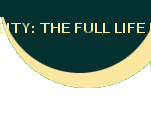| |
MUTUALITY: THE FULL LIFE PROCESS
By Uriah J. Fields
In a Nutshell: The Mutuality Philosophy
The human race is faced with the challenge of a human race--lifetime. It is the challenge of existence. Can we survive? Can we find meaning in survival? the Creator gave humans dominion over the earth and all its resources, including self-rule. Despite the collective consciousness of the human race we have not demonstrated a willingness to live in a humane society. We forge ahead, in spite of ourselves, to that crucial and pivotal point where we can make a quantum leap that will usher in the transformation of man and his world. {But will we?}
Not in all history has man been so vulnerable and doom-intrigued as he is now. The possibility that he will destroy himself is real and it could happen without nuclear war.
... Restlessness and meaninglessness that are prevalent in our society, can no longer be considered mere alienation. Indeed, man has abandoned himself and the next logical step for him to take is self-annihilation. But he has acted illogical before, so, just maybe, the illogical behavior this time around will catapult him into the human potential obit.
Decadency, feelings of hopelessness, disease, pollution, poverty and corruption are present nearly everywhere. People are despairing and the garden once beautiful and nourishing is now barren. It is more like a cesspool than a river. There is so much to be done before the garden, our embattled and life-sucking world, may bloom again and dispense fragrances that will remove the bitterness we taste and keep us from becoming the modern dinosaurs of planet earth. We are the gardeners and the seeds which together have the power to bring forth a rich harvest, including healing. Let us tend this life and our living with care that the harvest might be beautiful. If humans are to save themselves from themselves they will have to become practitioners of Mutuality which is discussed in detail in the remaining portion of this discourse. The Mutuality practitioner is the person best prepared to survive and experience meaning in survival.
Mutuality: The Full Life Process
Mutuality, in essence, is the concept of
man as a responsible being, with
his own happiness as both the
practical and ultimate purpose of
his life, with creative expression as
his noblest activity, and love as his
only absolute.
(Love is the good we do and it alone
when well served is always good
and right in every situation).
Since I discovered and embraced Mutuality, while still in my twenties, I have never changed any of my fundamentals about this concept. Of course, I have expanded my knowledge of details, of specific issues, of definitions, of applications -- and intend to continue expanding it.
"Mutuality," a naturalistic Full Life Process philosophy, was discovered by this writer while he was on a seven-year search in pursuit of an alternative to integration. It began while he was involved as a civil rights activist during the Montgomery Bus Boycott and ended successfully in 1963. He discovered that Mutuality is, indeed, the only viable response to, and solution for, the race problem (racism) but more than that, it is the higher consciousness response to total living, including all kinds of relationships which engender meaning in life and promote personal fulfillment. Included in these are: parent-child relationships, man-woman relationships, teacher-student relationships, minister-parishioner relationships, employer-employee relationships, friend-friend relationships and nation-nation relationships. As revealed in the Full Life Process, Mutuality is livingness, but not just biological livingness. "Soul" or "essence," may be other recognitions of what it means.
In Mutuality there are seven principles which we call Mutuality principles and two procedures employed in the application of Mutuality called Mutuality methods. Both these principles and methods of Mutuality correspond to the naturalness of man and his health-producing ecological relationship to the Cosmos which include, but is not limited to, his environment. These Mutuality methods embrace eclecticism and may be employed, depending on the situation specific," separately or together. Below is a description of each of these principles and methods of Mutuality.
Mutuality Principles
1. Responsibility... is the condition which exists when accountability is accepted for being human, i.e., being animal and divine. This means choosing oneself. The responsible person is the determinant of his own life, a "doer" rather than an object "done-to."
2. Freedom... is choosing and doing what one wants to do while taking responsibility for his choice and action, regardless to the outcome. Freedom rests with economic, intellectual and moral conditions but is highly personal, social redeeming and destiny-prescribed.
3. Love-power... is an inner-drive or soul-force which propels a person to be and do good. It is unconditional, cannot be negated, and impacts both the lover and the one loved. Love is the strongest power and greatest wonder in the universe.
4. Creativeness... is a state of consciousness that exists when a person is being perculiarly himself while spontaneously releasing creative talents -- physical, mental and spiritual endowments. It is personality-oriented rather than achievement-oriented. The releasing process, not the product produced, or how, or if, that product will be used defines and denotes creativeness. Even if the product is not known to anyone other than the person who produced it, he is nonetheless creative.
5. Self-Transcendence... is the effortless reach or faith-leap which extends beyond heredity and environment, cause and effect and "creature" response existence. It is the God-consciousness which produces health and salvation that are transcendent of heredity and the environment and is perpetually transforming.
6. Commitment... is the exercise of faith in matters of ultimate concern. It is, in paraphrase, the statement, "This I am, this I know, this I feel, this I do. I am being the knowing, the feeling and the doing. It is standing by the choice made."
7. Enjoyment... is delight which is more stupendous and rapturous than the thrill that comes from pleasure, satisfaction or happiness that might come from temperament and favoring circumstances. It is soul-rejoicing that comes from being in alignment with one's inner environment, i.e., vertical alignment with the Infinite. At such time the flood gates of the soul are opened and the waters of delight gush forth in orgasmic exhilaration.
Mutuality Methods
1. Dynamic Insistence... is spirited assertiveness or creative flowing which conforms to both naturalness and reality. It means being positive rather than negative, on the offensive rather than the defensive, acting rather than reacting, insisting rather than resisting, and cause rather than effect. It is an attitude which embodies gratitude, fortitude, altitude, latitude, magnitude and rectitude in the affecting and promoting of vicissitude.
2. Altruistic pragmatism... is a theory or doctrine which affirms that whatever works is good, providing the good of the other person or persons is put on even par with that of the doer. This is like asking "What can I do in my interest when I consider the other person's or persons' interest as being equal to my own interest?" Altruistic pragmatism is the recognition that good and right have no basis or validity apart from altruism and pragmatism.
Psychomutuality
Because it will be necessary for some people to enter "Psychomutuality" before they are able to become earnest students of Mutuality and since others can accelerate their mastery of the understanding of Mutuality as well as their health by engaging in it, the writer feels that it is incumbent upon him to introduce Psychomutuality before leaving the discussion on Mutuality.
Psychomutuality is a therapeutic procedure rooted in the principles of Mutuality and it deals with the discovery or recovery of personality wholeness. It is love-therapy at work in an empathy-directed relationship arising from the expressed need to work through difficulties by means of love and understanding, which enables the client (not patient) to assume growing responsibilities and live a more satisfying and fulfilling life. In Psychomutuality each client is encouraged to arrive at his own solution to the problem of his own existence. On this essence issue there can be no "big brother," "papa," or "Uncle Sam" determining who you are or taking care of you. At best, these may assist you, and they are not the most desirable or preferred candidates to aid the person who would be self-sufficient, or at least concerned about being in charge of his own life. Although that solution though highly individual, it cannot be egocentric because a person by nature has a basic need for life-enhancing mutual relations with other people. Therefore, if the values the individual lives by are to have meaning, they must not only be personally satisfying but also socially healthy. Psychomutuality, like Mutuality, is a way of improving the bioigraphy, or maybe we could say autobiography, of the person.
Every person, movement or system has a philosophy. Ideas and ideologies, be they relevant or irrelevant, motivate individuals and ideas, be they constructive or destructive manipulate and direct the course of or control individuals or groups. This is no less true for the Mutuality practitioner, notwithstanding, his balance and alignment posturing. This is a fact of life: as the philosophy of a person or a society goes so goes that person or that society. Application of the naturalistic Full Life Process philosophy of Mutuality produces healthy individuals and can, if it impacts a significant portion of the population, create a healthy community -- the ultimate community.
(Taken from "The Mutuality Warrior" by Uriah J. Fields, pp.20, 26-30 and 52)
Copyright 1990 & 2015 by Uriah J. Fields
Please note: "The Mutuality Warrior," by Uriah J. Fields, 5 x 8.5, 138 pages.
To purchase this book, make check or money order, in the amount of $10.95 plus $4.00 for postage and handling (total of $14.95), payable to: Uriah J. Fields. Autograph provided, if requested.
Mail your order to:
Uriah J. Fields
P. O. Box 4770
Charlottesville, VA 22905
|


















































































































































